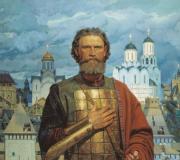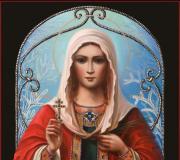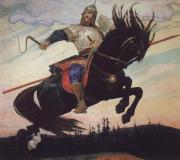Other materials about A.V. and P.G
Anna Vasilievna Ganzen (née Vasilyeva) is a talented Russian translator of Scandinavian writers, wife of the Danish-Russian literary figure, translator Peter Ganzen.
Anna Vasilievna was born on December 20, 1869 (new style January 1, 1870) in county town Kasimov (Ryazan province) and was the thirteenth and last child from parents who belonged to bourgeois class. Of the 13 children, only two survived and grew up - the older sister and Anna (the age difference was about 20 years).
Anna's father - Vasily Vasilyevich Vasiliev, born in 1817 from an “unknown father” and Kasimovsk bourgeois Vasilisa Spiridonova, received his patronymic and surname godfather. He graduated from the district school and entered the service in the Kasimovskaya city council- first as a delivery boy, and then became a scribe, a clerk, and, finally, having completed a self-taught bookkeeping course, an accountant. For 35 years of impeccable service and for many years community work(kept reports free of charge in the city hospital, managed the hospital office, audited some branches of the city economy, was a deputy from the bourgeois society when compiling lists of ordinary people, then a bourgeois headman (elected position) and, finally, a member of the city duma), received the title of personal honorary citizen (in 1872).
Anna's mother - Maria Petrovna (née Alyanchikova) - for 8 years younger than father- was the granddaughter of a serf peasant and the daughter of a trade clerk. She was left an orphan early, she learned to read and write from a sexton, but she only learned to read well and wrote poorly.
In the fall of 1872, his father, and soon his mother and Anna, moved to St. Petersburg, where he first got a job as a clerk at the Russkiy Mir newspaper, and then as an accountant at a brass factory (on the Vyborg side). After some time, due to weakened vision, he was transferred to the position of cashier and storekeeper. In 1882 he had a stroke, from which, although he recovered, he became unable to work. Mother has been all her life housewife and at almost 60 years old, she couldn’t find any income on the side, and she had to have someone take care of the sick and serve the whole family of 3 people.
Anna learned to read from her mother at the age of four and immediately became addicted to books. She was very incapable of needlework and very capable of learning, so her parents sent Anna to a gymnasium (7th grade) so that she could become a teacher. She excelled especially in Russian language and literature, foreign languages, history and geography.
It was hard in the family financial situation, so I started tutoring and giving lessons German language. She graduated from high school in the spring of 1887 with a silver medal.

After graduating from high school, I took on all sorts of things suitable job, - except for the so-called “black” one, because she was too weak and anemic after many illnesses suffered in childhood. The seventh-grade gymnasium did not even give Anna, the medalist, the right to be a “home teacher”; To do this, it was necessary to exchange the high school certificate for a “diploma” from the Ministry of Public Education, and for it one had to pay twelve rubles, which were not found. Therefore, Anna interrupted herself with random lessons, tidied up her home libraries, took correspondence, and corrected student notebooks.
Soon fate brought Anna together with a first-class telegraph operator and writer Pyotr Gottfridovich Hansen, a Dane by origin and language. Anna became the teacher of his young daughter, who had lost her mother, and six months later his wife and employee.
In 1890, several of them were published in the periodical press. general works- short articles about Scandinavian literary and scientific activities, and in 1891 in the magazine “Northern Messenger” a translation of Ibsen’s drama “Hedda Gabler”. Under the guidance of her husband, Anna mastered first his native language - Danish, and then the other two Scandinavian languages, and translations - literary, artistic and popular science - from these languages, as well as critical and biographical articles and essays about Scandinavian writers became her profession.
For the first four years, their common literary works were published under the sole signature of her husband (Peter Ganzen), who was generally in charge of the entire business part - writing out foreign literary materials, made the selection, negotiated with editors and publishers, Anna only knew purely literary work.
Together with her husband, she translated the entirety of Hans Christian Andersen (1893 - 1895). In 1894, with the beginning of the publication of their translation of “The Collected Works of Hans Christian Andersen” (in 4 volumes), they began to subscribe to literary works both (Anna and Peter Ganzen). This continued until 1917, until Peter Ganzen returned to his homeland, where he died in December 1930 at the age of 84.

Anna Vasilyevna did a lot of literary work and was involved in raising five children (her stepdaughter and four of her own children). She took all possible part in “readings for the people”, which were organized by a group of advanced intellectuals at some factories and hospitals, was a member of parent circles, then from 1905 - a member of “ Parents' Committee” gymnasium, where her sons studied, and from 1914 almost until the end of 1917 she worked quite intensively in the 17th city guardianship - in different sections of the Department of Assistance to the Families of Reserves Called to War.
After October revolution Anna Vasilievna remained in Soviet Russia. In the fall of 1918, she began working first as an employee and consultant of the publishing house headed by Alexei Maksimovich Gorky. World Literature”, then Leningrad and Moscow GIZ and other publishing houses.
She died in 1942 in besieged Leningrad in his apartment on Vasilyevsky Island. She was buried at the Smolensk cemetery in St. Petersburg.
Anna Ganzen... What a ringing name! It was as if someone from the street knocked on the frost-covered window - briefly and cheerfully, and the glass echoed through the rooms: “An-na Gan-n-zen...”
Anya was born on December 8 (21st New Style) 1869 in small town Kasimov, on the Oka River. There were only a few days left before Christmas, and everyone was in a wonderful mood. The stoves were burning hot, and the smoke above the chimneys stood in the frosty air as if enchanted. The street creaked with felt boots and clanked with buckets.
Anya began writing poetry early. Many girls write poetry and then give it up. Anya has this habit of writing down her feelings in poetry that has remained throughout her life.
Oh, world of harmonious consonances,
Visions, images, paintings
And magically poetic dreams,
I'm only attracted to you...
This is what Anya wrote at the age of fourteen, when children usually no longer believe in fairy tales. But, it seems to me, precisely because Anya was so trusting, dreamy and kind, fate soon gave her a fabulous meeting.
Here's how it happened. Anya's father, merchant Vasily Vasilyevich, moved the family to St. Petersburg. Anya began studying at the Foundry Gymnasium (and later graduated with a silver medal). Once at a ball, sixteen-year-old schoolgirl Anya Vasilyeva met former actor Royal Theater in Copenhagen by Peter Hansen. By that time, Peter had left the stage, entered the Russian service, became a postal and telegraph official of the 2nd category and was in charge of a telegraph school. Peter Hansen was an unusual official. After the service, he sat down to translate books by Russian writers into Danish. This is how he met and then became friends with Leo Tolstoy, Vladimir Solovyov, Ivan Goncharov...
In 1888, the young people got married and Anya Vasilyeva became Anna Ganzen. Soon she learned Danish, Norwegian, and Swedish from Peter. One day Peter began to translate the works of H. C. Andersen into Russian. Anya began to help. And either because Peter told her a lot about Andersen, whom he knew in his youth, or because Anya remained a child at heart, she was successful in translating fairy tales, and we still read the great Dane in Anna Hansen’s translations .
Together with her husband, Anna translated all of Andersen, as well as the collected works of Ibsen and a number of novels by modern Scandinavian writers. She independently translated into verse Elenschläger's tragedy "Jarl Hakon", "Princess Turandot" by Schiller, "Henry V" by Shakespeare (published under the editorship of S.A. Vengerov), "A Thousand and One Nights" by Golger Drahman, dramatic poem"Gergard Grim" by Thor Gedberg and many other works of Scandinavian writers.
Anna and Peter Hansen had five children: sons Vladimir, Lev and Dmitry, two daughters - Marianna and Olga. For them, Anna Vasilievna herself wrote fairy tales in verse and even published her own book of poems and stories for children, “The Christmas Tree of Christ.”
The revolution of 1917 found Peter Hansen in Denmark. Dmitry lived in Riga and also ended up abroad. Lev and Vladimir died. Anna Vasilievna could go to her husband in Denmark, but stayed with her daughters in her homeland. She made the same courageous choice in 1941, when the war began and Leningrad found itself under siege. The seventy-two-year-old translator remained in the starving and freezing city, where she died on April 2, 1942.
Russian empireAnna Vasilievna Ganzen (maiden name - Vasilyeva; -) - Russian translator of Scandinavian writers, wife of a Danish-Russian literary figure, translator Peter Hanzen.
Biography
Anna lived in St. Petersburg, graduated from the Foundry Gymnasium with a silver medal in 1887, owned three foreign languages. After graduating from high school, she responded to an advertisement in a newspaper for the hiring of a secretary and assistant in housekeeping, which was published by Peter Ganzen, who also lived in St. Petersburg at that time. A year later, in 1888, they got married, and Anna, having studied the Scandinavian languages (Danish, Swedish and Norwegian), became his active assistant and co-author. The Hansen couple translated Scandinavian writers into Russian - Hans Christian Andersen, Henrik Ibsen, Knut Hamsun, Bjornstjerne Bjornson, Søren Kirkegaard, Johan August Strindberg, Karin Michaelis and others. They signed their translations as “A. and P. Hansen."
After the October Revolution, Anna remained in Soviet Russia.
Children
- Lev Petrovich Ganzen
- Vladimir Petrovich Ganzen
- Marianna Petrovna Ganzen-Kozhevnikova
- Emmanuil Petrovich Ganzen
- stepdaughter-Olga Petrovna Ganzen
Write a review of the article "Gansen, Anna Vasilievna"
Links
- // Encyclopedic Dictionary of Brockhaus and Efron: in 86 volumes (82 volumes and 4 additional). - St. Petersburg. , 1890-1907.
Notes
An excerpt characterizing Hansen, Anna Vasilievna
He carefully moved away the shoulder on which she was lying, looked into her face and carefully sat her down on a chair.“Adieu, Marieie, [Goodbye, Masha,”] he said quietly to his sister, kissed her hand in hand and quickly walked out of the room.
The princess was lying in a chair, M lle Burien was rubbing her temples. Princess Marya, supporting her daughter-in-law, with tear-stained beautiful eyes, still looked at the door through which Prince Andrei came out, and baptized him. From the office one could hear, like gunshots, the often repeated angry sounds of an old man blowing his nose. As soon as Prince Andrei left, the office door quickly opened and the stern figure of an old man in a white robe looked out.
- Left? Well, good! - he said, looking angrily at the emotionless little princess, shook his head reproachfully and slammed the door.
In October 1805, Russian troops occupied the villages and towns of the Archduchy of Austria, and more new regiments came from Russia and, burdening the residents with billeting, were stationed at the Braunau fortress. The main apartment of Commander-in-Chief Kutuzov was in Braunau.
On October 11, 1805, one of the infantry regiments that had just arrived at Braunau, awaiting inspection by the commander-in-chief, stood half a mile from the city. Despite the non-Russian terrain and situation ( orchards, stone fences, tiled roofs, mountains visible in the distance), to the non-Russian people, looking at the soldiers with curiosity, the regiment had exactly the same appearance as any Russian regiment had, preparing for a review somewhere in the middle of Russia.
In the evening, on the last march, an order was received that the commander-in-chief would inspect the regiment on the march. Although the words of the order seemed unclear to the regimental commander, and the question arose how to understand the words of the order: in marching uniform or not? In the council of battalion commanders, it was decided to present the regiment in full dress uniform on the grounds that it is always better to bow than not to bow. And the soldiers, after a thirty-mile march, did not sleep a wink, they repaired and cleaned themselves all night; adjutants and company commanders counted and expelled; and by morning the regiment, instead of the sprawling, disorderly crowd that it had been the day before during the last march, represented an orderly mass of 2,000 people, each of whom knew his place, his job, and of whom, on each of them, every button and strap was in its place and sparkled with cleanliness . Not only was the outside in good order, but if the commander-in-chief had wanted to look under the uniforms, he would have seen an equally clean shirt on each one and in each knapsack he would have found the legal number of things, “sweat and soap,” as the soldiers say. There was only one circumstance about which no one could be calm. It was shoes. More than half the people's boots were broken. But this deficiency was not due to the fault of the regimental commander, since, despite repeated demands, the goods were not released to him from the Austrian department, and the regiment traveled a thousand miles.
Ganzen Anna Vasilievna Ganzen, Anna Vasilievna, nee Vasilyeva is a talented translator. Born in 1869. Having married Peter Hansen (q.v.), together with him she translated the entirety of Andersen (St. Petersburg, 1893 - 95), the collected works of Ibsen and a number of novels by modern Scandinavian writers. She independently translated into verse Elenschläger's tragedy "Jarl Hakon" ( separate edition 1904), “Princess Turandot” by Schiller, “Henry V” by Shakespeare (published under the editorship of S.A. Vengerov), “A Thousand and One Nights” by Golger Drachman (Moscow, 1904), dramatic poem: “Gergard Grim” by Thor Gedberg (Moscow , 1904) and others. She also published a book for children younger age with stories and poems: “The Christmas Tree of Christ” (St. Petersburg, 1901).
Biographical Dictionary. 2000 .
See what “Ganzen Anna Vasilievna” is in other dictionaries:
Wikipedia has articles about other people with this surname, see Hansen. Wikipedia has articles about other people with this surname, see Vasilyeva. Ganzen Anna Vasilievna Vasilyeva Anna Vasilievna Date of birth: 1869 ... Wikipedia
- (nee Vasilyeva) talented translator. Genus. in 1869. Having married P. G. G. (see), together with him she translated the entire Andersen (St. Petersburg, 1893 1895), collection of op. Ibsen (not yet completed), a number of contemporary novels. Scandinavian writers in... ... Big biographical encyclopedia
- (nee Vasilyeva) talented translator. Genus. in 1869. Having married P. G. G. (see), together with him she translated the entire Andersen (St. Petersburg, 1893 1895), collection of op. Ibsen (not yet completed), a number of contemporary novels. Scandinavian writers in Russia... ... encyclopedic Dictionary F. Brockhaus and I.A. Ephron
- (Hansen, Hanzen) Russian spelling surnames of Danish origin Hansen: Men: Hansen, Alexey Vilgelmovich (Aleksey Vasilyevich; 1876 1937) marine painter, grandson of I.K. Aivazovsky. Ganzen, Vladimir Alexandrovich... ... Wikipedia
Anna Kamenkova ... Wikipedia
Coat of arms ... Wikipedia
This term has other meanings, see Kasimov (meanings). City of Kasimov Flag Coat of Arms ... Wikipedia
Wikipedia has articles about other people with this surname, see Michaelis. Michaelis Karin Michaelis Karin ... Wikipedia
Den grimme Ælling ... Wikipedia
This term has other meanings, see Little Match Girl (meanings). The Little Match Girl Den lille Pige med Svovlstikkerne Genre: fairy tale
Books
- Set in a box "The Gifts of the Magi" + "The Snow Queen", O. Henry, Hans Christian Andersen. About the book When it’s white outside the window, and frosty stars sparkle in the black velvet sky, it’s time to light the candles and, wrapped in a blanket, pick up a book. Whoever you spend this cozy time with...
- The most beautiful fairy tales: collection, Grimm, Jacob, Grimm, Wilhelm Karl, and others. Collection of the best classic fairy tales in the design of contemporary Italian illustrators continues the best traditions famous Italian artists. Favorite characters: Snow White, Puss in Boots,...
| Anna Vasilievna Ganzen | |
| Lua error in Module:Wikidata on line 170: attempt to index field "wikibase" (a nil value). | |
| Birth name: |
Vasilyeva Anna Vasilievna |
|---|---|
| Nicknames: |
Lua error in Module:Wikidata on line 170: attempt to index field "wikibase" (a nil value). |
| Full name |
Lua error in Module:Wikidata on line 170: attempt to index field "wikibase" (a nil value). |
| Date of Birth: |
Lua error in Module:Wikidata on line 170: attempt to index field "wikibase" (a nil value). |
| Place of Birth: | |
| Date of death: |
Lua error in Module:Wikidata on line 170: attempt to index field "wikibase" (a nil value). |
| A place of death: | |
| Citizenship (nationality): |
Lua error in Module:Wikidata on line 170: attempt to index field "wikibase" (a nil value). |
| Occupation: |
translator |
| Years of creativity: |
With Lua error in Module:Wikidata on line 170: attempt to index field "wikibase" (a nil value). By Lua error in Module:Wikidata on line 170: attempt to index field "wikibase" (a nil value). |
| Direction: |
Lua error in Module:Wikidata on line 170: attempt to index field "wikibase" (a nil value). |
| Genre: |
Lua error in Module:Wikidata on line 170: attempt to index field "wikibase" (a nil value). |
| Language of works: | |
| Debut: |
Lua error in Module:Wikidata on line 170: attempt to index field "wikibase" (a nil value). |
| Awards: |
Lua error in Module:Wikidata on line 170: attempt to index field "wikibase" (a nil value). |
| Awards: |
Lua error in Module:Wikidata on line 170: attempt to index field "wikibase" (a nil value). |
| Signature: |
Lua error in Module:Wikidata on line 170: attempt to index field "wikibase" (a nil value). |
| Lua error in Module:Wikidata on line 170: attempt to index field "wikibase" (a nil value). | |
|
Lua error in Module:Wikidata on line 170: attempt to index field "wikibase" (a nil value). |
|
| [[Lua error in Module:Wikidata/Interproject on line 17: attempt to index field "wikibase" (a nil value). |Works]] in Wikisource | |
| Lua error in Module:Wikidata on line 170: attempt to index field "wikibase" (a nil value). | |
Anna Vasilievna Ganzen(maiden name - Vasilyeva; -) - Russian translator of Scandinavian writers, wife of the Danish-Russian literary figure, translator Peter Hansen.
Biography
Anna lived in St. Petersburg, graduated from the Foundry Gymnasium with a silver medal in 1887, and spoke three foreign languages. After graduating from high school, she responded to an advertisement in a newspaper for the hiring of a secretary and assistant in housekeeping, which was published by Peter Ganzen, who also lived in St. Petersburg at that time. A year later, in 1888, they got married, and Anna, having studied the Scandinavian languages (Danish, Swedish and Norwegian), became his active assistant and co-author. The Hansen couple translated Scandinavian writers into Russian - Hans Christian Andersen, Henrik Ibsen, Knut Hamsun, Bjornstjerne Bjornson, Søren Kirkegaard, Johan August Strindberg, Karin Michaelis and others. They signed their translations as “A. and P. Hansen."
After the October Revolution, Anna remained in Soviet Russia.
Children
- Lev Petrovich Ganzen
- Vladimir Petrovich Ganzen
- Marianna Petrovna Ganzen-Kozhevnikova
- Emmanuil Petrovich Ganzen
- stepdaughter-Olga Petrovna Ganzen
Write a review of the article "Gansen, Anna Vasilievna"
Links
- Ganzen, Anna Vasilievna // Encyclopedic Dictionary of Brockhaus and Efron: in 86 volumes (82 volumes and 4 additional). - St. Petersburg. , 1890-1907.
Notes
| Translator | This is a draft article about a translator. You can help the project by adding to it. |
An excerpt characterizing Hansen, Anna Vasilievna
Mom smiled at me sadly and said tenderly:- Goodbye, girl. Whoever you are - happiness to you in this world...
And, hugging her little ones, she turned to the glowing channel. All of them, except little Katya, were very sad and clearly very worried. They had to leave everything that was so familiar and so familiar, and “go” to God knows where. And, unfortunately, they had no choice in this situation...
Suddenly, in the middle of the luminous channel, a luminous female figure and began to smoothly approach the stunned family huddled together.
“Alice?..” the mother said hesitantly, peering intently at the new guest.
The entity, smiling, extended its arms to the woman, as if inviting her into her arms.
- Alice, is it really you?!..
“So we have met, dear,” said the luminous creature. - Are you really all?.. Oh, what a pity!.. It’s too early for them... What a pity...
- Mommy, mommy, who is it? – the stunned little girl asked in a whisper. - How beautiful she is!.. Who is this, mom?
“This is your aunt, dear,” the mother answered affectionately.
- Aunt?! Oh, how good – a new aunt!!! Who is she? – the curious girl did not let up.
- She's my sister, Alice. You've never seen her. She left for this “other” world when you were not yet there.
“Well, then it was a very long time ago,” little Katya confidently stated the “indisputable fact.”
The glowing “aunt” smiled sadly, watching her cheerful and nothing wrong with this new life situation unsuspecting little niece. And she happily bounced on one leg, trying out her unusual “new body” and, remaining completely satisfied with it, stared questioningly at the adults, waiting for them to finally go into that extraordinary glowing “ new world"... She seemed completely happy again, since her whole family was here, which meant that “everything is fine with them” and there was no need to worry about anything else... Her tiny children's world was again habitually protected by the people she loved and she no longer had to think about what happened to them today and just waited for what would happen next.
Alice looked at me very carefully and said tenderly:
- It’s too early for you, girl, you still have long haul ahead...




